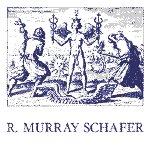To my shame, the music of the Canadian composer R. Murray Schafer (b. 1933) was scarcely known to me, and this was both a brave and a wise programming choice for Blackheath's Sunday Morning series, which is justifiably attracting increasing attention. The audience was, predictably, not large, but less attenuated than had been the dire effect of presenting a notable trio with wind instruments (notoriously death to the box office!) the previous week.
Relevant to those problems, Shafer himself can be heard on line in his interview excerpt, Music behind walls, discussing his dissatisfaction with the limitations of concert halls and how in his forties he began to radically transform audience experience and expectations with musical theatre pieces in a variety of mostly outdoor settings often at dawn or overnight. Schafer talks about conventional critical divisions within the world of music and proposes a very different way of looking at cultural change.

Murray- Schafer is well respected in his own country, and - ironically - he has published "British Composers in Interview" (1963). Has any of our composers reciprocated? His Patria (homeland) a cycle of related music dramas, is claimed as "perhaps the most radical and challenging cycle of music dramas to be produced within the past half century". About his eight string quartets, Schafer's publisher Arcana writes: - - string quartets occupy a special place in his repertoire and are considered to be among his most important works. The medium is pushed beyond traditional limits by the incorporation of spatial dislocations, movement and vocalization, but in each work the musical argument is always paramount. Although composed at different times in Schafer's career they contain many relationships and have been frequently performed together. N.B. There are no parts to the string quartets. All the players read from full scores. - -This was a virtuoso work played continuously, and which stretched these excellent players, who clearly relished its demands and had no problems at all with the extended techniques required. The Duke Quartet has been associated with the minimalist persuasion, but Shafer's quartet has an adventurous, questing character at a level of complexity which remains within the bounds of the accessible. It was well received and should be readily accepted by audiences who have become used to the quartets of Bartok (CD available from the Canadian Music Centre).
A great success, and cleverly complemented with a quartet by the South African born, Ireland domiciled Kevin Volans, No. 6 of an impressive oeuvre. This one, if heard on radio or CD, would be better described as an Octet. In the concert hall it has a unique fascination, with the four live players matched to perfection by four (surely themselves?) pre-recorded and transmitted with sound quality and balance so equal that the eye and ear strain to distinguish which is being heard. The music suggests a slightly less rarefied Feldman, mostly quiet, serene rocking music, but with more variety of dynamic and allowing some clashing harmonies occasionally. Kevin Volans is a complete individualist, who might perhaps be described loosely as an intelligent minimalist, who eliminates inessentials from his carefully crafted scores; John Woolrich is an English composer who, to my mind, shares some of his aesthetic in that respect.
Kevin Volans has described his string quartets as the spine of his output, and the 4th & 5th can be enjoyed on a CD superbly played by The Duke Quartet and recorded in a perfect ambience at Forde Abbey, recommended for a unique listening experience: Collins Classics 14172.
Peter Grahame Woolf
 Return to:
Return to: